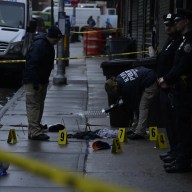By Corey Bearak
The death of Timothy Stansbury, the unarmed 19-year-old gunned down by an NYPD officer on a Brooklyn rooftop, ought not to have happened. It was tragic. No one disputes that. While the reaction at City Hall and One Police Plaza was markedly different than the prior occupants at both those citadels, the bad outcome still concerns me and many other New Yorkers of all backgrounds.
We had a bad incident but a better response, yet we need a mechanism in place to help prevent future bad incidents.
Queens is not immune. We have our housing projects in Far Rockaway, Astoria, Jamaica, Flushing. And the shooting did not occur in a vacuum. One indication of how well the police are doing in training — both at the academy and the ongoing in-service kind — is civilian complaints filed of police misconduct. The Civilian Complaint Review Board, or CCRB, does not investigate criminal acts; it looks at non-criminal, inappropriate behaviors of police officers.
A look at the Civilian Complaint Board data reveals complaints of misconduct against police officers increased 21 percent from calendar year 2002 to calendar year 2003. In real numbers that means going from 4,612 to 5,581.
In Queens South precincts (100th, 101st, 102nd, 103rd, 105th, 106th, 107th and 113th) the numbers were worse. Complaints increased 25.5 percent over the same period, rising from 231 to 290.
Queens North precincts (104th, 108th, 109th, 110th, 111th, 112th, 114th and 115th) fared better, increasing just 7.3 percent (178 to 191) but an astronomical 77.8 percent comparing just December of each year. Though the monthly Queens North total involves increasing from nine to 16, it stands out as part of a disturbing trend.
Interestingly, the NYPD Housing Bureau, responsible for patrol of Housing Authority projects, experienced a decrease. City Hall needs to act.
Mayor Michael Bloomberg was reported to have promised the people of New York “that we will do everything we can to learn from Timothy’s death.” I concur with that sentiment. What can we do? What should we do?
The mayor and his police commissioner certainly responded differently than the previous administration, and their actions certainly helped reduce the possibility of tension that could have resulted.
This commentary is not about passing judgment on the police officer’s conduct. A Brooklyn grand jury opted not to indict; a possible federal review may be in the offing and the NYPD will conduct its own review. Commissioner Ray Kelly made his own pronouncement that the Patrolmen’s Benevolent Association criticized and still others welcomed it.
The PBA argues the commissioner may have unfairly branded the conduct of the officer when he spoke critically of the officer’s action in the shooting.
No matter which view you take on Kelly’s take on the tragic police shooting of young Timothy, all New Yorkers ought to commend the police commissioner for correctly ordering a review of the procedures and training used that may have figured in the shooting. That’s what is needed short-term.
Long-term we need to move from reactive to proactive measures in regard to helping reduce the chances of another lost life, another tragic shooting, and the questioning of the conduct of a police officer or officers that follows.
The Mollen commission appointed by former Mayor David Dinkins to review police corruption and misconduct made an independent police oversight board its key recommendation. Former City Council Speaker Peter Vallone, to his credit, tried to establish such a board, brand new. Former Mayor Rudy Giuliani reacted to overrides of his veto with a successful lawsuit to block that law.
Rather than create a new agency, empower the existing police oversight agency, the Civilian Complaint Review Board, to be a fully independent board with each appointment subject to council confirmation and a budget a percent of the NYPD’s. This re-engineered board would study and recommend practices of the NYPD that affect members of the public, including tracking systemic patterns of abuse and oversight and, most importantly, periodic reviews to ensure that the NYPD appropriately trains and supervises its police officers.
The Queens Civic Congress Platform supports this. Community boards in four boroughs also embraced this reform. It makes sense; it will help save lives and, just as importantly, it will help ensure police officers get the ongoing training, support and supervision they need as they deal with an important job that never gets easy. In fact, the vast majority of decent men and women in the NYPD do their job every day with respect for the citizens of this city and their rights.
If New York City had an independent NYPD monitor — a re-engineered Civilian Complaint Board — it would conduct an outside professional review of various NYPD procedures and training that particularly impact in communities of color and figure in problematic actions. Perhaps then any procedures and training that may have figured in the shooting — the unholstering of a firearm — could have been addressed, perhaps saving a life.
In the end, it’s all about justice.
Corey Bearak is an attorney and adviser on government, community and public affairs. He is also active in Queens civic and political circles.
































